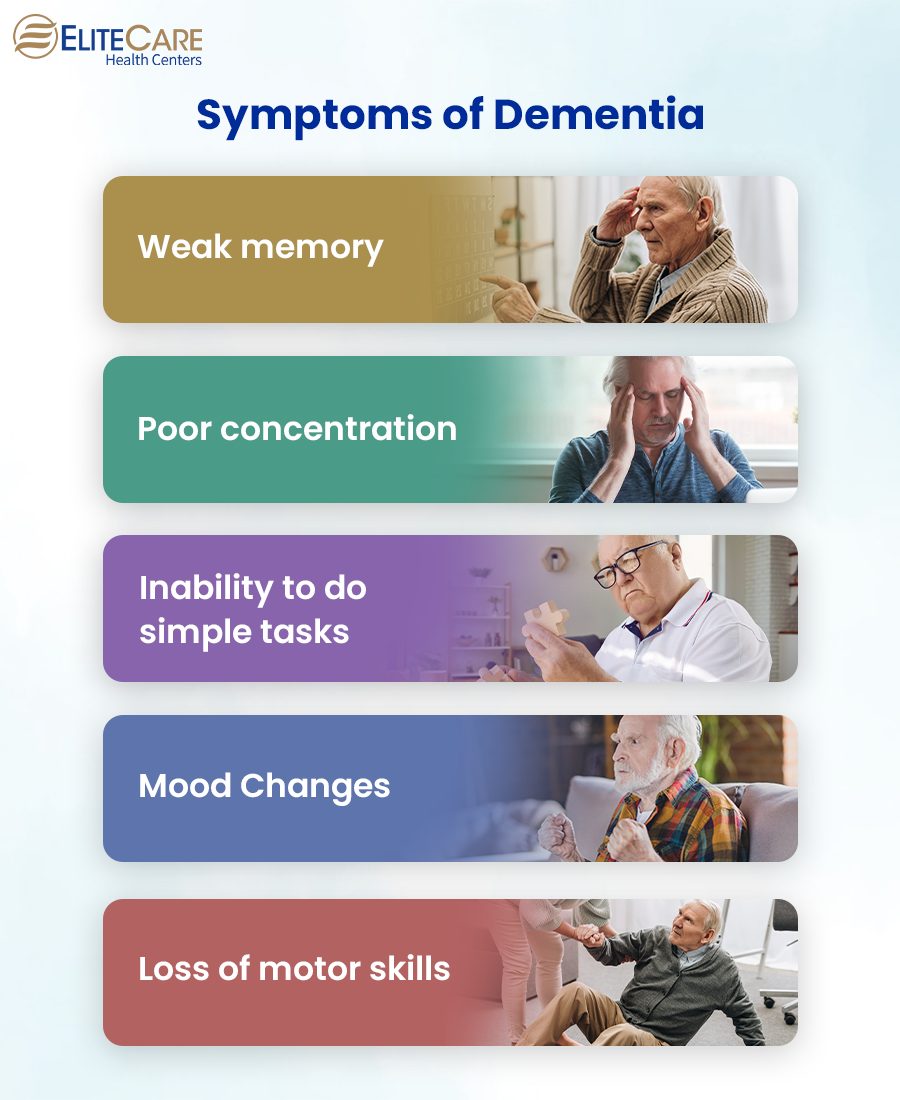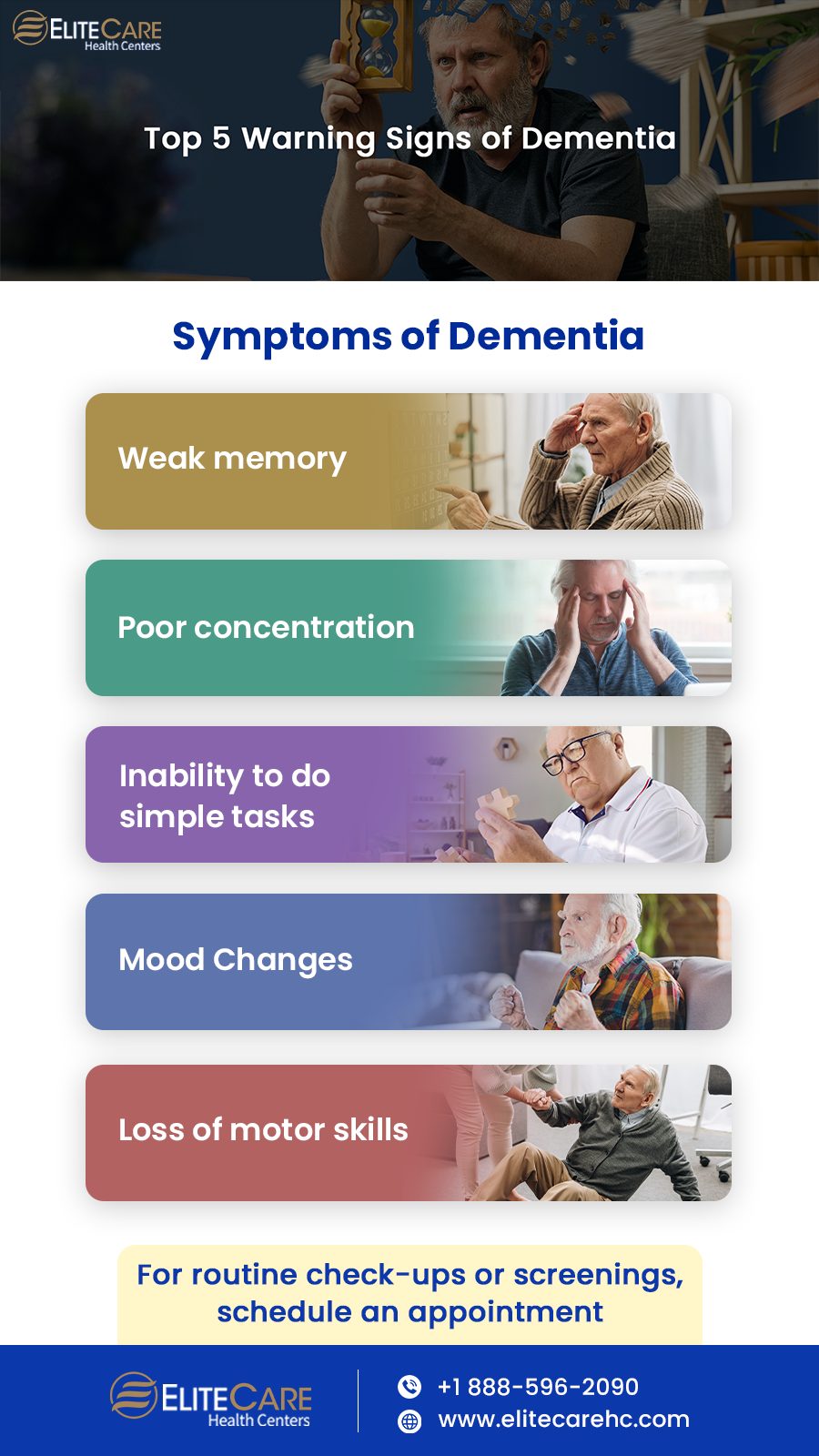
In the United States, 5% of seniors above the age of 70 and 37.4% of those above the age of 90 suffer from dementia. For a lot of older adults, dementia is an inevitable reality. In most cases, the initial symptoms may appear a decade before the actual diagnosis making it tough to treat the illness early.
What Causes Dementia in Older Adults?
The onset of certain types of dementia is linked with an abnormal build-up of two proteins called amyloid and tau. An excess of amyloid causes plaques in the brain while an excess of tau protein causes the neurons to tangle. These plaques and neuron tangles usually affect the brain’s memory centres first and then progress over to the rest of the areas over time. Tau protein spreads more easily in the brains as we age thus making elderly people more susceptible to Dementia.
Read More: Can Certain Food Improve Your Brain Health?
Symptoms of Dementia in the Elderly

Dementia severely affects the cognitive, emotional and physical abilities of senior citizens. Some of the common warning signs of Dementia are:
- Poor short-term memory
- Poor concentration
- Difficulty performing simple tasks
- Changes in mood and personality
- Functional decline of motor abilities
Could it be Dementia?
If an elderly loved one is struggling to carry out simple chores or becoming increasingly forgetful, it might help to get some professional help. Visit a physician who can assess if they are suffering from a potentially treatable condition that could be misunderstood as dementia. Depression, head trauma or vitamin B12 deficiency, all of which are quite common in senior citizens, can cause reversible memory loss.
Similarly, Creutzfeldt-Jakob Disease or Huntington’s Disease can also cause memory loss and motor difficulties. But their treatment and prognosis can differ significantly from that of dementia or other related disorders.
To determine whether an older adult is suffering from dementia, a physician might have to run a battery of physical and neurological tests. Early detection can help treat certain causes of dementia and hence it is advisable to get tested sooner than later.
Read More: Top Relaxation Exercise You Can Use Today
How To Help Seniors Suffering from Dementia
Set a daily routine
Having a daily routine for food, medicines, showers, exercise and recreation can help older adults reorient themselves if they are prone to forgetfulness. Having a schedule can also give them a sense of direction and make each day easier to deal with.
Read More: Can seniors do strength training exercises?
Help keep track of their appointments
Maintaining a large calendar with their appointments written on them can help seniors keep track of where they need to be and when. It’s also helpful to provide them with a pen and notebook so they can make their notes.
Remove objects that could cause injuries
Removing rugs or sharp objects and securing loose wires or cables in living spaces can significantly lower the risk of a fall injury. Additionally, keeping slippery surfaces dry and rooms well-lit can help them move around in the house without any obstruction.
Engage them with simple games or activities
Give them ample time to finish tasks
Seniors suffering from dementia often take a long time to finish simple tasks. Partly because their cognitive abilities are declining and also because their motor skills are not as good as they used to be. Rushing them to finish eating or hurrying them to get dressed can create needless stress. Even worse, it can cause the elderly to become frustrated or physically injured. Instead, it would be more helpful to remain calm and give them enough time to finish what they are doing.
Read More: What to expect from an annual physical exam
Conclusion
Dementia can significantly affect the cognitive and physical abilities of the elderly. Their personality and behaviors may also change as a result. It is imperative, therefore, to take the initiative to address any signs or symptoms that could point to an underlying illness to ensure early detection.
If your elderly loved one is struggling with memory loss or related symptoms, make an appointment with a geriatrician for further testing or visit the nearest EliteCare Health Center for more guidance. EliteCare is one of Florida’s best medical clinics, with a team of highly trained primary care physicians who offer services like venipuncture, immunizations, EKG and more. Visit their website to schedule an appointment today.
- Tags:cause of dementiaCenter For Wellnesselderly sundowningfamily medicine specialisthealth and wellness centerhealth and wellness servicesmedical cliniconline doctor consultationprimary care clinic near meprimary care physiciansenior care servicessundowning dementiawellness care centerswellness check doctorwhat are signs of dementia






